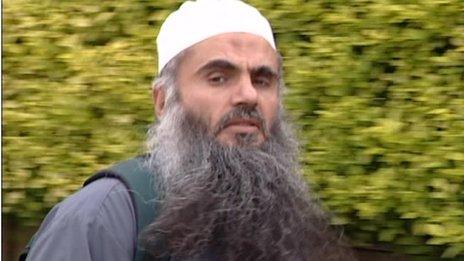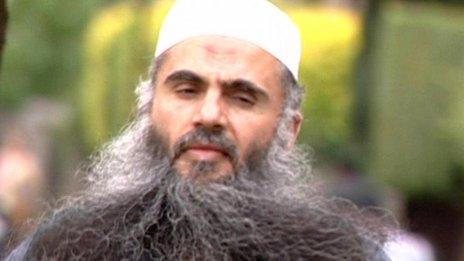Abu Qatada case: Theresa May to visit Jordan 'within days'
- Published

Abu Qatada has fought a long battle against his removal from the UK
Home Secretary Theresa May will visit Jordan "within days" to try to strike a deal over the deportation of Abu Qatada, the Home Office has said.
The UK is seeking assurances that evidence obtained through torture will not be used against the radical cleric, who faces terror charges in Jordan.
He was released from a UK jail on strict bail conditions, external last month.
A Home Office spokesman told the BBC a newspaper report that Mrs May was already in Jordan was "speculation".
BBC political correspondent Chris Mason says the spokesman did not flatly deny the report by the Sun newspaper.
Earlier, one of Mrs May's ministers James Brokenshire told Sky News the home secretary would visit the country "very, very soon."
Mrs May has already said publicly she intended to continue talks which Mr Brokenshire held earlier with Jordanian authorities, when he travelled to the country.
'Pursuing all options'
She said at the time of Abu Qatada's release that the UK and Jordan were "pursuing all options with regards to his deportation."
Both countries were committed to ensuring Abu Qatada, 51, faced justice, she added, saying it was "my intention to travel back to continue those negotiations shortly".
The government has been seeking assurances that evidence gained through torture would not be used in any trial against Abu Qatada if he were sent back to Jordan, where he is wanted on terrorism charges.
Ayman Odeh, the Jordanian legislative affairs minister, has said his country passed a constitutional amendment in September to ban the use of evidence obtained through torture.
Abu Qatada, alleged to be a dangerous extremist, was freed from Long Lartin jail in Worcestershire on 13 February.
Alleged terror involvement
A judge ended his six-year detention after the European Court of Human Rights (ECHR) blocked his deportation to Jordan.
The court said evidence obtained by torture might be used against him there.
He is now under strict bail conditions, including a 22-hour curfew that allows him to leave home only for a maximum of an hour, twice a day. He has also been electronically tagged.
The UK government must show significant progress towards deporting Abu Qatada within three months or his bail conditions could be lifted.
Abu Qatada was convicted in his absence in Jordan of alleged involvement in a plot to target Americans and Israeli tourists during the country's millennium celebrations.
- Published23 February 2012

- Published16 February 2012

- Published9 May 2012

- Published15 February 2012
- Published14 February 2012

- Published26 June 2014

- Published13 February 2012
- Published14 February 2012